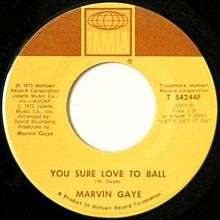You Sure Love to Ball
| "You Sure Love to Ball" | ||||
|---|---|---|---|---|
 | ||||
| Single by Marvin Gaye | ||||
| from the album Let's Get It On | ||||
| B-side | "Just to Keep You Satisfied" | |||
| Released | January 2, 1974 | |||
| Format | 7" single | |||
| Recorded | 1973, Hitsville West, Los Angeles, CA | |||
| Genre | Soul | |||
| Length | 4:46 | |||
| Label |
Tamla T 54244 | |||
| Songwriter(s) | Marvin Gaye | |||
| Producer(s) | Marvin Gaye | |||
| Marvin Gaye singles chronology | ||||
| ||||
"You Sure Love to Ball" is a song released by American recording artist Marvin Gaye. Released on January 2, 1974, it was the third and final single to be released from Gaye's acclaimed album, Let's Get It On.
Song overview
Unlike most of the material on Let's Get It On, which focused more on romance music including a brief social plea ("Keep Gettin' It On"), this song focused entirely on the sexual portion of its subject. The song starts off with a rhythm section including guitars, a bass and drums and a saxophone solo. In the middle of the solo, induced moans can be heard from a couple before Gaye finally begins singing the lyrics. The term "ball" was slang for having sex.[1]
Chart performance
The song was issued as a single on January 2, 1974. Initial radio airplay was good enough for the song to peak at thirteen on the Hot Soul Singles chart and fifty on the Billboard Hot 100.[2] However, "You Sure Love to Ball" soon peaked out allegedly due to the controversial nature of the track, making the song the least successful of the three tracks released on Let's Get It On. Its b-side included the solemn ballad closer of the album, "Just to Keep You Satisfied".
Covers and samples
In 1976, singer Sylvia covered the song. Singer Will Downing later covered the song for the Marvin tribute album, Marvin Is 60: A Tribute Album as did Keith Washington on his 1998 album, KW. Usher's 2001 song, "Twork It Out" from his 8701 album, featured heavy sampling of "You Sure Love to Ball".
Personnel
- All vocals by Marvin Gaye
- Sexual moaning by Fred and Madeline Ross
- Instrumentation by Los Angeles session musicians and possibly Marvin Gaye
References
- ↑ Dyson 2004, pp. 152-154.
- ↑ Whitburn, Joel (2004). Top R&B/Hip-Hop Singles: 1942-2004. Record Research. p. 226.
External links
Sources
- Dyson, Eric Michael (2004). Mercy Mercy Me: The Art, Loves and Demons of Marvin Gaye. New York/Philadelphia: Basic Civitas. ISBN 0-465-01769-X.